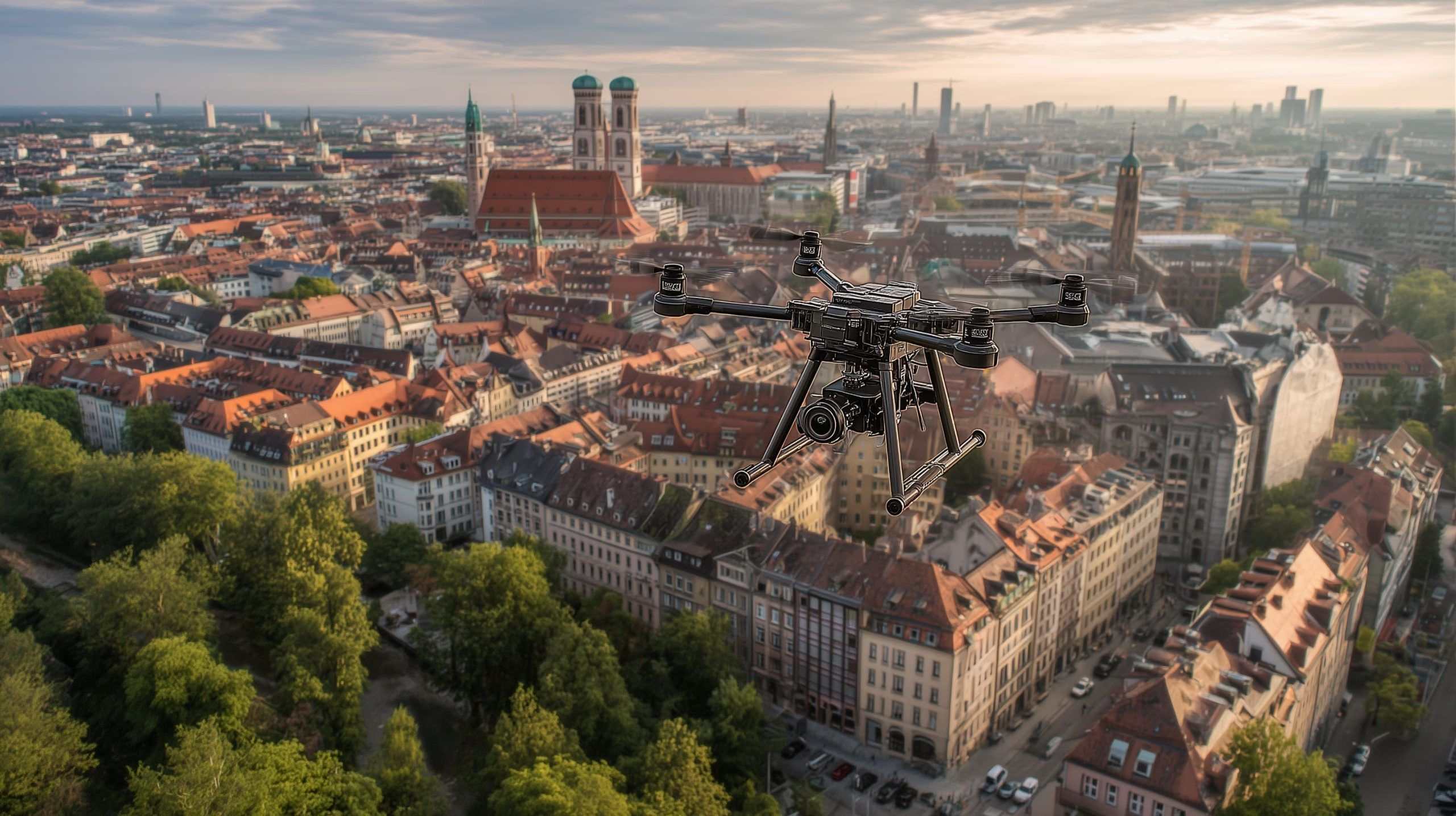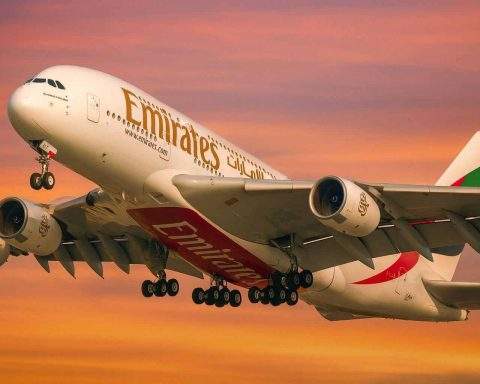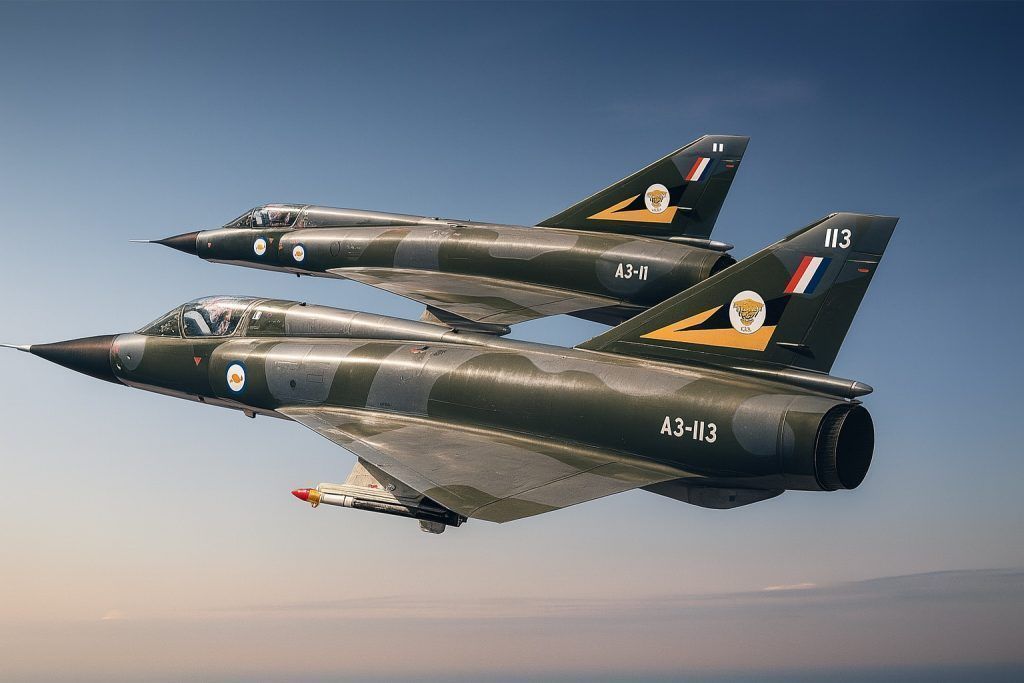- The Open category rules cap drone altitude at 120 meters and require no special permit if you meet the Open-category conditions (weight, VLOS, no dangerous goods).
- Online registration with the Luftfahrt-Bundesamt (LBA) is mandatory for operators of drones 250 g or heavier, or any drone under 250 g with a camera or data sensor, with a single e-ID valid for all your drones.
- There are two EU certificates: the A1/A3 ‘small drone license’ and the A2 ‘large drone license’, both valid for five years and available to pilots aged 16 and up.
- Open-category sublines include Category A1 for drones up to 900 g (or under 250 g for legacy models), Category A2 for under 4 kg with a 30 m non-involved-person buffer (5 m for slow flights), and Category A3 for up to 25 kg with at least 150 m from residential, commercial, industrial, or recreational areas.
- Drones may not fly within 1.5 km of any airport and, inside Munich Airport’s CTR, altitude is limited to 50 m unless air-traffic clearance is obtained.
- Filming in Munich’s public spaces requires a Drehgenehmigung from the city (and possibly a Sondernutzungserlaubnis), with applications usually submitted weeks in advance.
- Residential overflight is restricted, with drones over 250 g prohibited from flying over residential premises without the owner’s explicit consent (camera drones under 250 g face similar privacy considerations).
- Dropping objects or carrying dangerous goods is illegal, and attaching pyrotechnics or weapons to a drone is strictly forbidden.
- Night operations are allowed if the drone is properly lit, and since July 1, 2022, a flashing green light is required to indicate the drone’s orientation after dark while keeping VLOS.
- Enforcement can reach fines up to 50,000 euros, drones may be seized on the spot for violations, and cases may involve LBA, Luftamt Südbayern, DFS, police, and possibly the courts.
Thinking of flying a drone in Munich? The Bavarian capital enforces strict drone regulations aligned with Germany’s national and EU-wide rules. Both casual hobby pilots and commercial operators face detailed requirements – from mandatory registration and licensing to unexpected local no-fly zones – all under penalty of hefty fines. Below is an up-to-date, comprehensive guide to Munich’s drone laws, covering everything from basic flight rules to special Munich-specific restrictions.
Rules for Recreational Drone Use
Munich’s drone regulations do not distinguish much between recreational and commercial use – the laws focus on drone weight, capabilities, and risk category rather than the pilot’s intent Adac Dfs. Most consumer drones (whether flown for fun or profit) fall under the “Open” category defined by EU rules, which applies uniformly to hobbyists and professionals. Key rules for recreational pilots include:
- Fly in the Open Category: Typical hobby drones in Munich must be operated in the EU’s Open category, meaning they weigh under 25 kg, stay within visual line-of-sight (VLOS), fly below 120 m altitude, and do not carry dangerous goods or drop items Bmv Dfs. If you follow these conditions, no special permit is needed for hobby flights.
- No Overflight of Uninvolved People: Even for fun flights, you must avoid flying over crowds or gatherings of people. In the Open category A1 subcategory, a small drone can approach people but may not fly directly over them Dfs. Heavier hobby drones fall in subcategories requiring strict minimum distances from people (see Altitude, Weight & Distance Restrictions below).
- Model Aircraft Clubs: Flying at an approved model aircraft club field is considered recreational. While Munich is urban, some club airfields outside the city allow higher altitudes or other exceptions for members under supervision. Unless you’re at such a site, all standard rules (altitude limits, no-fly zones, etc.) apply equally to recreational users.
In short, “just for fun” is no excuse – Munich enforces the same baseline safety rules on hobbyists as on anyone else Adac. Every recreational pilot must also carry insurance and proper licenses (covered below) just like commercial operators.
Regulations for Commercial Drone Use
Commercial drone operations in Munich are subject to the same foundational flight rules as recreational use, with additional expectations for professionalism and authorization when needed. There is no separate “commercial license,” but operating for business often means you’ll be flying larger drones or in more complex scenarios that fall outside the basic Open category allowances Bmv. Important points for commercial operators:
- Mandatory Insurance and Compliance: Liability insurance is compulsory for all drone flights in Germany, and this is especially crucial for businesses Adac. Companies must ensure every drone pilot on staff is properly certified (e.g. has the EU competency certificates) and that each drone is registered and labeled with an e-ID (see next section). All data protection and privacy laws also apply – for example, if you’re filming people or private property for a commercial project, consent and GDPR compliance are essential.
- Advanced Operations Require Permits: Many commercial missions (mapping projects, inspections, deliveries, etc.) might require you to fly beyond visual line-of-sight, above 120 m, or near people/structures. These fall into the “Specific” category and do require prior authority approval Bmv. For instance, a drone delivery trial or a nighttime construction site survey would need an operational permit from the aviation authority (details in Permits & Approval Processes).
- Filming and City Permits: Planning to film aerial footage in Munich’s city center or at public events? In addition to aviation rules, you must obtain a filming permit from the city if you will use public streets or plazas beyond normal pedestrian usage Muenchen. Munich’s authorities treat drones with cameras as “equipment” in filming – for example, using a camera drone in a busy area like Marienplatz or the English Garden for a movie or commercial requires a special permit (Sondernutzungserlaubnis) from the city Muenchen. Commercial filmmakers should apply weeks in advance and may face restrictions on timing (e.g. off-peak hours for downtown shoots).
Bottom line: Commercial drone use in Munich is viable but heavily regulated. Businesses should budget extra time for approvals and ensure pilots are fully qualified. The key regulatory agencies (Luftfahrt-Bundesamt, Luftamt Südbayern, etc.) overseeing commercial operations are described later in this report.
Mandatory Drone Registration and Licensing Requirements
Germany requires every drone operator to register and every competent pilot to be licensed, and Munich is no exception. Before taking to Munich’s skies, make sure you’ve completed these steps:
- Online Registration (e-ID): All drone operators (the person or legal entity responsible for the drone) must register with the Luftfahrt-Bundesamt (LBA) before the first flight Adac. This is done online and results in a unique electronic identification number (e-ID) assigned to you. Registration is mandatory if your drone weighs 250 g or more, or if it’s under 250 g but has a camera or any sensor capable of personal data capture (unless it’s a certified toy) Bmv Dfs. In practice, almost all camera drones, even small ones, trigger this requirement. You must mark the e-ID on every drone you operate (usually via a sticker or plate on the drone) so that authorities can identify the owner Bmv Dfs. The registration process will ask for your name and proof of required insurance, and a small fee is charged. Note: One registration covers all your drones, and your e-ID remains valid indefinitely (update your info if it changes) Adac Adac. Foreign visitors flying in Munich must likewise register – tourists are expected to register in the first EU country where they fly (so if Munich is your first EU stop, register with LBA before flying) Dronelicense.
- Drone Pilot Licenses (Competency Certificates): Since 2021, Europe has introduced a common drone pilot licensing system. There are two levels of certificates often nicknamed the “small drone license” and “large drone license.” In EU terms, these are: the EU Proof of Competency (certificate for A1/A3) and the EU Remote Pilot Certificate (for A2) Adac Dfs. Anyone operating drones above the 250 g/camera threshold in Munich must obtain at least the basic A1/A3 certificate (this is the online theory test available through LBA) Bmv Dfs. This so-called “small” license (kleiner Drohnenführerschein) involves online training and a 40-question exam; it ensures you know the fundamentals of safe drone operation and EU rules. For more advanced flying, the A2 certificate (the “large” drone license) is required – specifically if you want to fly in closer proximity to people or in populated areas with a heavier drone (e.g. up to 2 kg in A2 category) Dronelicense Dfs. The A2 involves additional self-practical training and an in-person theoretical exam with an authorized entity Bmv. Both certificates are valid for 5 years and are recognized across the EU.
- Minimum Age: The minimum age to operate a drone in Germany is 16 years (for both recreational and commercial use) Dfs. Pilots younger than 16 may only fly under direct supervision of an adult who holds the proper drone license Adac. Many training programs and the LBA’s online test also enforce the 16+ rule for registration. Families in Munich should note that even a gifted drone to a child must be flown under adult oversight if it’s above toy category.
Tip: Always carry proof of your registration and certification (physical or digital) when flying. Authorities in Munich can ask to see your operator registration number and pilot certificate during any spot check or incident investigation.
No-Fly Zones and Restricted Areas in Munich
For safety and privacy, Munich has extensive no-fly zones where drones are prohibited or restricted. Violating these airspace rules can lead to immediate intervention by police or aviation authorities. Always check the current geo-zones before each flight. Major restricted areas include:
- Airports and Aircraft Approaches: Munich is home to a busy international airport (MUC), and drones cannot fly within 1.5 km of any airport’s perimeter without permission Dfs. This is a hard rule – a “no drone zone” – around all aerodromes in Germany. Additionally, Munich Airport’s controlled airspace (CTR) extends beyond 1.5 km; inside a control zone, drones may not exceed 50 m (164 ft) altitude without special clearance Dfs. In practical terms, do not fly in the general direction of the airport or anywhere near flight paths. Always maintain “sufficient distance” so you’re never an obstacle to manned aircraft Dfs. If you have a legitimate need to fly near an airport or in controlled airspace, you must request air traffic control clearance from DFS and get state authority permission in advance Dfs. (See Permits section for how to obtain these clearances.)
- City Centers and Crowded Public Areas:Drones must never fly over crowds or large gatherings of people in Munich Adac. This includes events like concerts, festivals, demonstrations, parades, sports events, or busy tourist sites when densely populated. For example, during the annual Oktoberfest, authorities impose a complete drone flight ban over the festival grounds and surrounding area for the entire event Muenchen. Even outside of special events, flying over busy pedestrian zones (Marienplatz, markets, etc.) or packed parks can violate the ban on endangering uninvolved people. Munich police and security officials treat crowd overflights very seriously for safety reasons – if in doubt, don’t fly over any gathering where people can’t move out of the way.
- Sensitive Government and Infrastructure Sites: German federal rules designate certain facilities where drone flights are prohibited within 100–150 m. In Munich this covers sites like police stations and facilities, security service buildings, hospitals, prisons, military barracks, power plants, and other critical infrastructure Tz Adac. You cannot hover a drone over a police operation or an accident scene, for instance, nor over a hospital emergency department or prison yard. Many government offices are also off-limits. It’s advised to keep a wide berth (at least 100–150 m) from any law enforcement or emergency service activity and from key installations such as communication towers, railway hubs, or major industrial plants. These restrictions exist to prevent interference, protect privacy, and guard against terrorism risks.
- Major Roads and Transportation Hubs: By law, “Hauptverkehrswege” (main thoroughfares like highways and busy roads) are sensitive areas – you should not fly directly over major roads, rail lines, or navigable waterways Adac. In a city like Munich, that means don’t fly along the Autobahn or over the central train station or bus terminals. Low-flying drones could distract drivers or engineers and cause accidents. Always plan your flight path to avoid hovering above moving traffic.
- Residential Areas (Privacy Restrictions): Unique to Germany’s privacy protections, there is a de facto ban on flying over residential property in many cases. Specifically, drones heavier than 250 g are not allowed to fly over residential premises without the explicit consent of the property owner or tenants Adac. Even drones under 250 g with a camera are treated the same – you cannot fly a camera-equipped drone in a residential neighborhood unless you have permission from those who live there Tz Adac. This rule is meant to prevent surreptitious filming and nuisances in private living areas. In practice, if you are in a typical Munich neighborhood, you should avoid flying over backyards, apartment complexes, or anywhere people have an expectation of privacy. (Flying from your own private yard is allowed, but you still must not intrude on your neighbors’ space without consent.)
- Parks and Natural Reserves: Munich’s plentiful green spaces come with rules too. Nature reserves and protected parks are generally no-fly zones for drones without special approval Dfs. For example, the Englischer Garten, Munich’s largest urban park, explicitly bans all drones and model aircraft in its grounds Bayern. This park is state-owned, and signs at entrances note that “Drohnen… sind nicht gestattet” (“drones and other flying devices are not permitted”) Bayern. Other historic gardens or palace parks (like Nymphenburg) under the Bavarian administration similarly prohibit drone flights to preserve tranquility and safety. Additionally, any officially designated Naturschutzgebiet (nature conservation area) around Munich is off-limits to protect wildlife. Always check the DFS or EASA UAS geo-zone map Muenchen to see if your launch point or flight path intersects a restricted natural area. Even in public parks where drones aren’t flat-out banned, be mindful of people and wildlife – local ordinance can treat drone disturbance as a punishable offense under nuisance or noise rules.
- Temporary No-Fly Zones: Be aware that Munich sometimes has temporary flight restrictions (per NOTAMs or local orders). For instance, during high-profile state visits, police operations, or large events, authorities may issue a temporary geo-fence where drones are forbidden. A prominent example is the Oktoberfest mentioned above, and similarly, large football matches or New Year’s Eve in central Munich could see temporary bans. These are usually announced via the city or aviation authority websites. Always check current notices before flying – the DFS drone map and apps will show “geographical zones” that are active Muenchen. Flying in a temporarily restricted zone (even accidentally) can result in your drone being intercepted by law enforcement.
As a drone pilot in Munich, it’s your responsibility to research the airspace each time. Use tools like the official DFS “Droniq” map or the maptool DIPUL Muenchen to identify all red zones and comply with posted signs (like “No Drone Zone” placards near airports or sensitive sites). When in doubt, choose open fields well outside the city for your flights.
Altitude, Weight, and Operational Restrictions
Munich’s drone laws impose clear limits on how high, how far, and in what manner you can fly. These technical restrictions are critical for safety:
- Maximum Altitude – 120 Meters: Drones in Munich may not fly higher than 120 m (394 ft) above ground level without a special permit Adac. This EU-wide limit ensures hobby drones stay well below manned aircraft traffic. The 120 m rule applies universally – whether you’re in the countryside or the city – and it used to be 100 m under older German law, but has now been standardized to 120 m Bmv. Exception: If you have explicit permission (see Permits section), certain operations can go higher, but never assume – exceeding 120 m is one of the easiest ways to get fined or have your drone confiscated in Munich.
- Keep Visual Line-of-Sight (VLOS): You must maintain direct visual contact with your drone at all times during flight Adac. This means no flying beyond the horizon or behind buildings where you cannot see the aircraft with your own eyes. First-person-view (FPV) goggles can only be used if a spotter is watching the drone, and even then, the drone should stay in a radius where it can be visually tracked. The typical maximum distance is often interpreted as about 500 m for a small drone in good weather Dronelicense, but there is no fixed distance in law – the requirement is that you can see and control the drone. In a dense city like Munich, buildings and trees will limit VLOS range significantly. Losing sight of your drone (e.g. flying behind a row of buildings) is illegal and dangerous – it could stray into people or no-fly zones without your awareness.
- Drone Weight Classes: The rules you must follow depend on your drone’s weight (and certification class). In general, 25 kg (55 lbs) is the maximum weight for any drone operation in the Open category Dfs – above that, it’s not allowed without a special “certified” aircraft authorization. Within the Open category, there are subcategories:
- Category A1 (Very small drones): Covers drones up to 900 g (if CE class C1) or legacy drones under 250 g. These can be flown in populated areas and even around people (though not directly over assemblies of people) Bmv. Most mini drones and DJI Mavic Mini class fall here. They still must obey altitude and privacy rules, but are granted more flexibility near bystanders due to their low weight.
- Category A2 (Small drones): Covers drones under 4 kg (class C2) Bmv. These may fly in urban or residential areas but must maintain a minimum 30 m distance from non-involved persons (which can be reduced to 5 m for low-speed flights) Dfs. To fly in A2, the pilot needs the A2 license. Many “prosumer” drones (2–4 kg) like the DJI Phantom or similar fall in this range – they can be used in Munich city areas only if you keep that buffer from people.
- Category A3 (Larger drones): Covers drones up to 25 kg (classes C3 and C4, or any heavier legacy drone >4 kg) Bmv. These drones cannot be flown in populated or residential areas at all in the Open category. You must keep at least 150 m away from any residential, commercial, industrial or recreational area Bmv. In practice, this means large drones or older drones without class marking (over ~250 g) can only be flown in wide open fields far outside Munich’s city center Adac Adac. If you have a heavy DIY quadcopter or an older DJI Inspire, for example, you’ll need to go well outside the metropolitan area or find an approved flying field. Attempting to fly such a drone in the city without a special permit is unlawful.
- Other Operational Rules: Additional operational restrictions include:
- Right-of-Way to Manned Aircraft: Drones must yield to all manned aircraft. If you see a helicopter or plane, you must immediately give way and/or land. Never assume they will avoid you – you must avoid them Adac. This is crucial near heliports (Munich has hospital helipads) or the airport outskirts.
- No Night Flying Without Lights: Flying at night is allowed in Germany without a special permit (a change from the old rules) so long as the drone is adequately lit Adac. Specifically, since July 1, 2022, German law requires a flashing green light on any drone flying after dark Adac. This light must make the drone’s orientation clear and distinguishable from other aircraft. Additional position lights (white, red) are recommended for visibility. Even at night, you must keep VLOS – so you might be limited to closer range. Be extra cautious: judging distance and avoiding obstacles is harder in the dark, and Munich’s city ordinance forbids creating excessive noise at night (drones can be noisy). Always check that night operations won’t disturb people; if in doubt, get explicit permission or conduct the flight in a remote area.
- No Dropping Objects: It is illegal to drop or release any objects from a drone mid-flight (e.g. dropping a package, water balloon, etc.) unless specifically authorized Dfs. This is to prevent injuries and littering. Attaching any kind of pyrotechnics or weapons to a drone is of course strictly forbidden.
- No Carriage of Dangerous Goods: You cannot carry hazardous materials (chemicals, explosives, etc.) on a drone Dfs. For most hobbyists this is a non-issue, but it’s mentioned in the rules to cover all bases.
Always double-check your drone’s class identification and the category it falls under. The EU drone classes (C0–C6) are starting to appear on newer drone models and indicate what category and conditions they can be flown in Adac. For instance, a class C1 drone (under 900 g with certain tech features) can be flown in A1 subcategory over people (with some caution), whereas a legacy drone without a class marking above 250 g by default falls into A3 (far from people) Adac. If unsure, assume a more restrictive category to stay safe and legal. And remember: these restrictions apply equally whether you’re flying for fun or for work – Munich expects all drone pilots to know and obey these operational limits.
Required Permits and Approval Processes
Some drone operations go beyond the “standard” rules of the Open category – for those, you’ll need special permission from authorities. In Munich, as elsewhere in Germany, two main authorities handle drone permits: DFS (air traffic control) for airspace clearance and the Landesluftfahrtbehörde (Bavarian state aviation authority) for operational permission. Here’s what you need to know about permits and approvals:
- Flying in Controlled Airspace or Near Airports: If you intend to fly within Munich Airport’s control zone or closer than 1.5 km to the airport, you must obtain ATC (Air Traffic Control) clearance prior to flight Dfs Dfs. DFS Deutsche Flugsicherung provides an online application form for drone clearances near airports Dfs. In practice, you will need to specify the flight area, maximum altitude, time, and have a justification. In addition to DFS clearance, you also need permission from the state aeronautical authority (the Government of Upper Bavaria’s aviation office) for such a flight Dfs. This dual approval ensures both air traffic and ground safety authorities agree to your plan. For example, a construction company inspecting a crane in downtown Munich (which lies in the outer airport control zone at certain altitudes) must coordinate with DFS and get a permit from Luftamt Südbayern. It’s wise to apply at least 2–3 weeks in advance for any flight in controlled airspace, as processing can take time.
- Exemptions for No-Fly Zones: As noted, many areas are off-limits – unless you secure a specific exemption. Under German law (§21h & §21i LuftVO), the state aviation authority can grant waivers for operations in otherwise prohibited zones on a case-by-case basis Bayern Bayern. This means if you have a “good cause” to fly over a normally banned area (say, a power company inspecting a power line near a residential area, or a film crew needing a drone shot over a normally busy plaza), you can apply for a permit to deviate from those restrictions. In Munich, these applications go to the Luftamt Südbayern (part of the Government of Upper Bavaria) which oversees the region’s aviation matters Bayern. The application will require details of the operation, safety measures, and why it cannot be done within the normal rules. For instance, flying closer than 150 m to a crowd or above 120 m or at night beyond current allowances would all require this special permit Dfs Dfs. The permit, if granted, will specify conditions (like maybe requiring a safety perimeter or a police presence). Keep in mind that exemptions are not guaranteed – they are usually granted only for professional, necessary operations that prove risk mitigation. Recreational flights almost never get permission to break no-fly rules.
- Applying for Permits: To request an operational permit in Bavaria, you typically need to fill out a form (often downloadable from the Oberbayern government website) and submit it with supporting documents (pilot qualifications, risk assessment, insurance proof, etc.) Bayern Bayern. Coordinate early with the authority – they may guide you on required safety measures. If your flight is near an airport or in controlled airspace, start with DFS clearance, as the state likely will ask for that or coordinate with DFS. Never fly first and ask later – unauthorized flights in restricted areas can result in fines or criminal charges.
- Munich City Filming Permits: As mentioned, if your drone operation involves filming or photography on Munich’s public roads, plazas, or parks for anything beyond trivial use, you need permission from the city authorities. The city’s Film and Media Office handles “Drehgenehmigung” (filming permits) for public spaces Muenchen. Their rules explicitly list camera drones as equipment that triggers the permit requirement Muenchen. You will need to apply detailing when and where you plan to fly, how large the crew is, and what safety measures you have. Munich often restricts drone filming to off-peak hours in crowded areas and may require a city staff or police liaison to be present. There may also be fees for using public land. Failing to get a city permit can mean your shoot is halted by authorities. (For private property filming, ensure you have the owner’s permission; for iconic sites like the Bavarian government buildings or monuments, additional clearances may apply.)
- Standard Scenarios and LUC: For very advanced commercial operations, note that EASA provides concepts like Standard Scenarios (STS) and a Light UAS Operator Certificate (LUC) which some companies can use to streamline approvals. If you’re a professional operator dealing with such frameworks, you likely have direct lines to the LBA or the Landesluftfahrtbehörde. These are beyond the scope of hobbyist rules but worth mentioning as part of the landscape. In Munich, no drone delivery or autonomous passenger drone operations can occur without moving into these certified categories, which involve intensive regulatory oversight.
Key tip: Whenever you’re unsure if your planned flight might break a rule (e.g. flying at 150 m altitude or within 100 m of a train line), reach out to the authorities beforehand. The Luftamt Südbayern in Munich is the contact for most permissions – they can advise if an exception is possible Bayern. It’s better to be on record seeking permission than to be caught doing something first. Munich’s environment is tightly controlled, so assume that if it’s not expressly allowed, it’s forbidden until you get approval.
Legal Responsibilities of Drone Operators
Operating a drone in Munich comes with serious legal responsibilities. As the drone’s pilot (and/or owner), you are accountable for everything that happens during your flight. Here are the main legal obligations:
- Maintain Safety and Avoid Endangerment: You are required by law to operate your drone in a manner that does not endanger other aircraft, people, or property. This means always yielding to manned aircraft, keeping well clear of people, buildings, and roads as described earlier, and never flying in a reckless way Adac Adac. If your drone does cause an incident (e.g. a crash that injures someone or property damage), you as the operator will be held liable for the consequences. German law treats drones as aircraft, so causing an aviation hazard can even invoke criminal penalties. Always conduct pre-flight checks (battery, controls, GPS) to minimize chances of malfunction mid-air.
- Respect Privacy and Data Laws: Munich is particularly sensitive about personal privacy. As a drone operator, you must not violate anyone’s privacy rights. Do not film or photograph people on private property without permission. Even in public, be mindful – using a drone to loiter outside someone’s window or to record in a private garden is illegal. The German GDPR and Federal Data Protection Act can apply to how you handle any footage. Essentially, you should treat a drone with a camera like serious surveillance equipment – use it responsibly and avoid capturing identifiable people unless necessary and permitted. The law explicitly bans equipped drones from residential overflight for this reason Adac. Authorities take complaints of “drone peeping” seriously in Munich; the police may respond to reports of drones invading privacy.
- Liability Insurance (Pflichtversicherung): Every drone flyer must carry valid liability insurance that specifically covers drone operations Adac. Standard personal liability policies typically do not include drones, so you’ll likely need a separate drone insurance or an add-on rider. This insurance is mandated by German aviation law – operating without it is an offense. The insurance should cover any damages your drone might cause (to third parties). When registering with the LBA, you have to declare your insurer. If you’re visiting from abroad, you must obtain coverage that is valid in Germany (some international drone insurance products exist). Always keep proof of insurance; in case of an accident or during random checks, you may need to present it.
- Flight Planning and Situational Awareness: As an operator, you’re expected to plan your flights in advance. This means checking for any applicable NOTAMs or geo-fence restrictions on the day of flight, assessing weather conditions (no flying in thunderstorms or high winds), and choosing a safe location for takeoff and landing Dfs. Good practice is to inform anyone nearby of your flight (for example, if flying in a quiet park area, let bystanders know you’re operating a drone). While not a strict legal requirement, failing to plan can lead to legal trouble if something goes wrong. For instance, if wind gusts carry your drone beyond your intended area, it’s still your responsibility.
- Operator ID and Drone Labeling: As noted, you must label your drone with your registration e-ID and carry your registration proof Bmv Bmv. If an authority asks, you need to produce it. Flying an unlabeled drone in Munich could lead to it being impounded until you prove ownership and compliance.
- No Flying Under Influence: It should go without saying, but operating a drone under the influence of alcohol or drugs is illegal. Munich’s police have zero tolerance for intoxicated drone operation – it would be treated similarly to drunk driving if caught.
- Incident Reporting: If your drone flight does result in a significant incident (collision with a manned aircraft, serious injury, etc.), you have a duty to report it to aviation authorities (LBA/BFU) just as a pilot would report an aircraft incident. For minor accidents (like crashing your drone on a street causing minor damage), you must still inform the affected property owners and exchange insurance details – hit-and-run rules apply in principle.
In essence, when you fly a drone, you are an aviator and must exercise the same care as any pilot. Munich’s regulators and courts will hold you to a high standard of responsibility. Always ask yourself before a flight: “Is this operation safe, legal, and respectful to others?” If not, adjust your plan or don’t fly.
Enforcement, Fines, and Penalties for Violations
Drone laws in Munich have real teeth. Enforcement is carried out by both federal agencies and local Munich authorities (including police), and penalties for breaking drone rules range from steep fines to confiscation of equipment – even criminal charges in extreme cases. Here’s how enforcement works and what’s at stake:
- Active Enforcement in Munich: Munich’s police are quite vigilant about drone activity, especially in sensitive areas. They have responded to incidents such as near-misses with aircraft and drones crashing in public places in the past Tz. Police patrols at events (like Oktoberfest or soccer matches) are on the lookout for unauthorized drones. Many city residents also know the rules and won’t hesitate to report a drone flying where it shouldn’t. So, expect that if you break a clear rule – for example, flying over a crowd or near an airport – law enforcement will likely intervene. Police can order you to land immediately and may seize your drone on the spot if a violation is observed. In some cases, Munich police have used signal jammers or drone detection systems at events to prevent incursions. The city’s approach is proactive: prevention first (signage, public awareness by campaigns on social media), but if that fails, they will enforce penalties.
- Schedule of Fines: Germany sets administrative fines for drone violations up to €50,000 in the most serious cases Adac. Typical fines for common offenses are lower but still substantial. For instance, flying without registration or license might incur a few hundred euros fine; flying in a no-fly zone or over people could be thousands of euros, depending on severity. Using a drone to spy on someone can also violate privacy laws, leading to separate fines under those statutes. If your drone causes an accident or serious disruption (say, forcing an aircraft to alter course), the consequences can escalate dramatically – investigations and potentially criminal charges for endangering air traffic (§315 StGB under German law, which is a felony). As of 2025, there have been cases in Germany of multi-thousand-euro fines for drone pilots who flew over crowds or in airport zones. In Munich, given it’s a high-profile city, the authorities won’t hesitate to levy the maximum allowed fine for egregious breaches to set an example.
- Legal Proceedings and Liability: Minor infractions are typically handled as administrative offenses (similar to a traffic ticket). You might receive a fine notice by mail if identified after the fact (your e-ID or drone serial could be traced). More serious cases involve police reports and possibly court appearances. If property was damaged or people injured, you could face civil liability lawsuits as well. Insurance will cover some damages, but it won’t shield you from fines or criminal liability if you were negligent or willful. For example, if your drone crashes through a car windshield because you flew over a road, you could be liable for the damage and also fined for the illegal overflight.
- Drone Confiscation: Authorities have the power to confiscate drones used in the commission of an offense. If you’re caught flying without a permit in a restricted area, the drone may be taken as evidence. In many cases, hobbyists don’t get their drone back at all if the violation was serious – it may be forfeited. So not only could you lose a €1000 drone, you’d pay fines on top of it.
- Enforcement Agencies: Several bodies are involved in enforcement. The Luftfahrt-Bundesamt (LBA) oversees regulatory compliance (they can issue fines for things like failing to register or improper licensing). The local state aviation authority (for Munich, Luftamt Südbayern) can also enforce violations of operational rules and issue penalties or bans on flying. Munich’s city authorities can fine you for violations of local ordinances (for example, breaching the park rules or filming without a permit). And of course, the Munich police can enforce any and all laws on the ground, often being the first responders to an incident. In some scenarios, the German Federal Police (Bundespolizei) might get involved – e.g. if a drone intrudes at the airport or a national security area – as well as the military police if near a military site. In short, there are many eyes watching – assume your drone is being observed whenever you fly in the city.
- How to Stay Clear of Trouble: The best way to avoid penalties is simple – follow the rules diligently. Keep your drone within line-of-sight and below 120 m. Stay away from prohibited zones. Always carry your papers (registration, license, insurance) when flying. Use technology to help – many drones (like DJI models) have geofencing that warn or prevent entry into no-fly zones; don’t bypass these safety features. Before flying in Munich, do a final checklist: Location OK? Altitude OK? People clear? Airspace clear? If anything is questionable, don’t risk it. The cost of a ruined trip due to fines or legal issues far outweighs the benefit of that “cool shot” or momentary thrill of bending the rules.
Munich is a wonderful city to capture by drone, but it’s also a city that experienced a near-collision between a drone and an Airbus and saw drones crash in public areas Tz – hence the strict stance. Fly responsibly and you’ll have no issues; push your luck and you could be facing the wrath of Bavaria’s law enforcement (and an empty wallet).
Key Regulatory Authorities Involved
Several authorities at the EU, federal, and local level oversee drone regulation in Munich. It’s useful to know who does what:
- European Union Aviation Safety Agency (EASA) – EASA developed the overarching framework for drone rules that now applies in Munich (and all EU countries). The EU regulations 2019/947 and 2019/945 (for operations and drone product standards, respectively) stem from EASA’s work Dronelicense. EASA sets the categories (Open/Specific/Certified), training requirements, and so on. While you won’t deal with EASA directly as a pilot, their rules are the reason the laws are uniform across Europe. EASA also provides online resources (like a Geo-Zones map and FAQs) to help pilots understand restrictions in member countries Muenchen.
- Federal Ministry for Digital and Transport (BMDV, formerly BMVI) – This German ministry implemented the EU rules into national law. They issued the updated Luftverkehrsgesetz (Aviation Act) and LuftVO (Air Navigation Ordinance) provisions that govern drones nationally. Their website provides summaries of the new rules Bmv Bmv. The Ministry is the top-level policymaker, but not an enforcement body.
- Luftfahrt-Bundesamt (LBA) – The LBA (Federal Aviation Office) is a key agency for drone pilots. It manages the online operator registration system and the pilot licensing exams Adac Bmv. When you register for an e-ID or take the A1/A3 test online, you’re interacting with LBA systems. The LBA also publishes extensive FAQs and guidance (though much is in German) and it approves the organizations that conduct the A2 exams Bmv. For enforcement, LBA can issue fines for non-compliance with registration or training requirements. They also maintain the database of registered operators – in case of an incident, law enforcement may contact LBA to trace a drone’s owner via the e-ID.
- Deutsche Flugsicherung (DFS) – DFS is Germany’s air navigation service provider (ATC). They control the airspace around airports and have taken on a role in drone integration. DFS manages flight clearances in controlled airspace – if you need permission to fly near Munich Airport or above 50m in its control zone, you go through DFS Dfs Dfs. They offer an online portal (DFS Drones) and mobile apps that show no-fly zones and allow submission of flight requests. DFS has also helped set up the DIPUL map tool that shows all “geographical zones” where drones have restrictions Muenchen. Furthermore, DFS is involved in developing U-space services for drones. In Munich, if you ever need real-time clearance or have an urgent need to coordinate (say a drone search-and-rescue operation near an airport), DFS will be in the loop.
- Landesluftfahrtbehörde (Bavarian State Aviation Authority) – In Germany, each state has its own aviation authority for local matters. Munich falls under the Luftamt Südbayern (Aviation Office of Southern Bavaria), part of the Government of Upper Bavaria (Regierung von Oberbayern) Bayern. This office is responsible for granting exemptions and permits for drone operations in its region Dfs. If you apply for a waiver to fly in a no-fly zone or want to do a beyond-line-of-sight operation, this is the authority that evaluates and issues the permission (or denies it). They also handle any state-level regulations – for instance, if Bavaria had a specific rule or needed to publish additional restrictions, it would come through this office. The Luftamt Südbayern works in concert with LBA and local law enforcement. Their contact info is public, and operators can call with questions. Think of them as the local drone regulators for Munich.
- Munich City Authorities: While the city of Munich doesn’t regulate airspace (that’s federal), it does exert control over land use and safety. Departments like the Public Order Office and the Traffic/Street Management Office issue the filming permits, park usage rules, and can enforce city ordinances related to drones (noise, nuisance, park regulations). The city’s role is mostly about where you can take off/land and ensuring public spaces are used safely. For example, Munich could theoretically ban drone take-offs in a particular park via a city ordinance even if airspace is unrestricted – and indeed, it has done so for some parks via rules of the park administration (e.g. English Garden ban by the state garden authority Bayern). The Munich police (Polizei München) also fall under local enforcement – they handle on-the-ground response to drone complaints or incidents, working closely with the city offices and aviation authorities.
- European and German Courts: As a final note, if there are legal disputes (like someone challenges a fine or a policy), the courts become involved. The EU Court of Justice ensures EU-wide drone regulations are applied uniformly, and German courts would handle appeals on fines or liability cases stemming from drone use.
Knowing these stakeholders can help you navigate compliance. For example, if you have a question about registering – check LBA’s resources. If you wonder about airspace around Munich – DFS’s drone map is the go-to Dfs. Need a permit to fly somewhere tricky – contact Luftamt Südbayern. And if you’re simply flying recreationally and want to make sure you’re good: respect the rules these authorities have set, and you likely won’t have to deal with them in person!
Munich-Specific Ordinances and Practices
In addition to national laws, Munich has local practices and rules that drone pilots should be aware of. These aren’t separate drone laws per se, but they affect how and where you can operate in the city:
- Public Parks and Recreation Areas: As mentioned, Munich’s famous Englischer Garten bans drones outright Bayern, and other major parks have similar policies. The English Garden is patrolled by park wardens; if they see a drone, they will ask you to land and leave. Munich’s municipal parks (those not under state control) currently don’t have a blanket drone ban in the city statutes, but they do fall under general noise and safety ordinances. If a drone is causing disturbance or danger in a park, authorities can act under those rules. Always check park entrance signage – many will indicate if drones or model aircraft are not allowed. Smaller neighborhood parks might not have signs, but common sense and courtesy apply. Keep well away from playgrounds or crowded lawn areas.
- Take-Off/Landing on City Property: Even though airspace is federally regulated, where you launch or land your drone can trigger local rules. For example, taking off from a public street or sidewalk in a busy area could be seen as obstructing public ways or creating a hazard – a city officer could cite you for that if it endangers pedestrians or traffic. The city can also control use of specific sites (e.g. you can’t just take off from a schoolyard or government building rooftop without permission). It’s generally advisable to take off from private property with permission or very open public fields. Some drone pilots in Munich use the banks of the Isar River or open fields on the outskirts as launch sites, which is wiser than inner-city streets.
- Oktoberfest and Event Restrictions: We covered Oktoberfest’s airspace closure Muenchen, but it’s worth emphasizing as a Munich-specific practice: each year, during the Wiesn (Oktoberfest), a temporary flight restriction (oftentimes a radius ~5 km around the festival grounds up to a certain altitude) is in effect Munich Fpv. The same typically goes for other major events – e.g., the Munich Marathon, large open-air concerts, or the annual Christmas markets might prompt authorities to announce drone bans. These are usually communicated via local news or the city’s press releases. So if you plan to fly during a major event timeframe, do extra research.
- Enforcement Trends in Munich: Munich’s law enforcement has embraced new technology to manage drones. It’s been reported that the police have used drone detection systems (RF scanners, etc.) around critical events. The city also encourages citizens to report rogue drones – a notable instance was a near-miss with an aircraft that led to a public tip-off campaign in 2017 Tz. Culturally, Bavaria tends to be law-and-order oriented, so you may find less tolerance for rule-bending compared to some places. If you do everything by the book, locals (and the police) often react positively – sometimes curious onlookers will even ask about your drone. But if you fly low over a beer garden full of people, expect an unfriendly reaction and a swift call to the cops.
- Noise and Time-of-Day Considerations: Munich has noise regulations (the “Immissionsschutz” laws) that could indirectly affect drone use. Very early or late flights in quiet residential areas might draw noise complaints, especially if a drone is large and loud. While the law doesn’t specify drone noise, general quiet hours (usually 10 PM to 6 AM in residential zones) should be respected. Also, repeatedly flying over someone’s house could be considered harassment even if you’re technically at legal altitude – they could seek a cease-and-desist under civil law if it’s a nuisance. It’s best to be a “good neighbor” when flying in the community.
- Drone Flying Communities and Locations: On a positive note, Munich has an active community of drone enthusiasts and designated model flying fields around. Clubs in the greater Munich area often have arrangements or exemptions that let members fly higher or perform FPV racing, etc., in controlled environments. If you’re a local or long-term visitor, connecting with a club (like via online forums or Facebook groups) can provide insight into safe spots to fly legally. Some popular unofficial flying spots include open areas north of the city and certain fields near the outskirts (away from the airport path). These aren’t “official” but have become known as low-risk areas to fly for fun – still, one must always verify no restrictions and follow all rules.
- Future local regulations: As drone usage grows, Munich may introduce additional local ordinances. For example, the city could consider creating designated drone parks or enforce stricter rules in busy tourist zones. It’s worth keeping an eye on city council announcements or local news regarding drones. In late 2023, there was discussion in some German cities about requiring permits for drone flights over certain urban areas beyond what federal law requires – while Munich hasn’t yet, it could follow suit if drone traffic increases.
In summary, Munich-specific rules revolve around protecting its public spaces and events. By understanding the local sensitivities – beer gardens, historic parks, big festivals – you can avoid stepping on toes (or breaking laws). When in doubt about a local rule, you can contact the Munich public order office or the state aviation office for clarification. Munich is a beautiful city to photograph from above, and by navigating the rules responsibly, you can capture it without incident. Safe flying!
Sources: The information in this report is based on the latest EU drone regulations and German federal laws, as well as official resources from the German Federal Ministry of Transport, the Luftfahrt-Bundesamt, DFS (German air traffic control), and local Munich authorities. Key references include the Bundesministerium für Verkehr’s 2021 drone regulation summary Bmv Bmv, the ADAC’s 2025 drone rules overview Adac Adac, DFS guidance for drone pilots Dfs Dfs, and Munich city’s published ordinances on park use and event restrictions Bayern Muenchen. These sources and regulations have been synthesized to provide an up-to-date guide as of mid-2025 – always check the latest local notices before you fly. Enjoy Munich’s skies responsibly!









